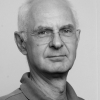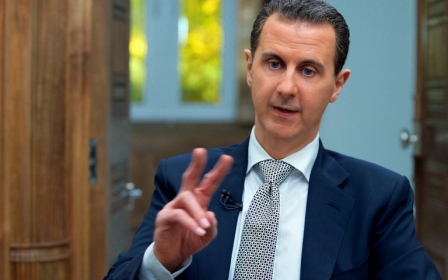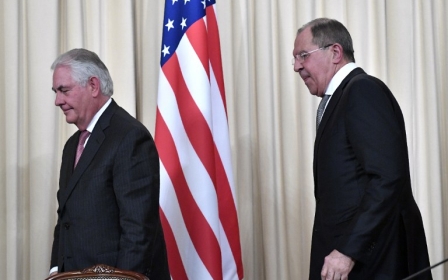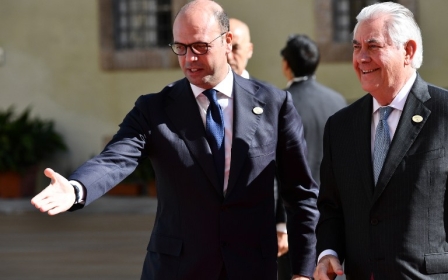US-Russia talks: No love-in, but no break-up either

After the worst week in Russian-American relations for a long time, and with each side accusing the other of breaking international law, Rex Tillerson's first visit to Moscow as US secretary of state ended on Wednesday with progress of sorts.
When the dust settles from the shouting of the last few days, the sticking point is still the political future of Syria and, in particular, the role of Assad
It was clearly not the love-in which seemed likely when Tillerson got the job in January, pledging to improve on Obama's frosty record of contacts with the Kremlin.
But President Vladimir Putin and his foreign minister, Sergei Lavrov, insisted civilised dialogue be resumed in the face of hostile Western criticism over the alleged use of chemical weapons by Syria's president, Bashar al-Assad, in the Idlib town of Khan Sheikhun.
More than 80 people were killed and hundreds poisoned in an attack which switched Trump administration policy on Syria and led to the first direct attacks by the US against Assad's government with the bombing of a Syrian airbase.
But there were some concrete achievements from the Moscow talks. The two sides re-instated the arrangement by which their air forces notify each other of their flight plans over Syria so as to avoid collisions. They set up a joint working group to discuss in detail their differences on the whole gamut of international issues. They agreed that the struggle against the Islamic State (IS) group remains the military priority in Syria.
With - or without - Assad?
When the dust settles from the shouting of the last few days, the sticking point is still the political future of Syria and, in particular, the role of Assad. As early as 2011 Obama committed himself to regime change in Damascus and gave material and political support to the armed opposition.
By contrast, Trump seemed uninterested, at least until this month.
The chemical weapons scandal changed his mood and Trump now looks more hawkish than Obama, both in his use of military force and in his insistence that Russia play a role in dumping Assad, the "butcher" and the "animal" in Trump's crude words.
So the central issue of Wednesday's meetings was whether Russia would give in. An immediate change of policy was obviously not on the cards since it is not in Putin's nature to make sudden concessions under pressure. But will he gradually and incrementally pull the rug from under the Syrian president?
'Russia does not let its friends down'
According to Russian experts in Moscow, there are multiple reasons why the Kremlin will not. They range from concerns about future chaos in Syria in the aftermath of regime change to the damage that would be inflicted on Russia's reputation in the Middle East if it gives way to international pressure and abandons a longterm friend.
'If Putin drops Assad now, it will have very serious consequences in the region'
-Andrei Kortunov, Russian International Affairs Council
"If Putin drops Assad now, it will have very serious consequences in the region. They might dislike Russia but at least they know that Russia doesn't let its friends down like some other countries usually do," said Andrei Kortunov, the director of one of Moscow's most respected think-tanks, the Russian International Affairs Council.
Kortunov said the key questions which Russian leaders would have put to Tillerson this week concerned the ideas which the US had for a post-Assad Syria.
"What kind of business plan do you have for Syria? How can you assure us it'll be different from Iraq or Libya?" said Kortunov.
"You get rid of an authoritarian ruler: are you ready to face the consequences? In Iraq, at least you prepared for a major intervention with boots on the ground. What abut Syria? Are you ready to make a commitment to this country? Are you prepared to lead the post-conflict reconstruction of Syria?"
As the Russians see it, regime change in Syria is more than an issue of removing one man or even a hundred top figures in the Assad entourage.
What's going to happen to the army and security services, they ask. If no plans are made for them, they may join the forces of Islamist militancy.
"IS was a kind of delayed product of the US intervention, whatever you say about it now. Regionally, it came from Iraq and it contained people who used to work for Saddam Hussein and offered their skills to IS," Kortunov told MEE.
A Western obsession
In the joint news conference after the Moscow talks, Lavrov was blunt. Complaining of the West's "obsession" with toppling foreign leaders, he outlined the chaos that had occurred in Iraq and Libya.
He added the examples of Western force and sanctions used to change Serbian policy over Kosovo and Sudanese President Omar al-Bashir's policy of letting South Sudan break away.
As to the Trump administration's long-term foreign policy intentions on the whole range of international affairs, Russian experts and officials are as puzzled as are observers in the US and other Western countries.
In his remarks welcoming Rex Tillerson on Wednesday, Lavrov talked of Washington's "confusing and sometimes openly contradictory ideas on the entire range of bilateral and international issues".
Putin made an equally sharp comment on Russian-American relations, saying that "the level of trust at the working level, especially at the military level, has not become better but most likely has deteriorated" since Trump took office.
He was clearly angry that both Trump and Tillerson accused Russia of having foreknowledge of last week's chemical attack, whereas Obama at the time of a similar attack in Ghouta, Damascus, in 2013 only criticised Syria.
More of the same?
The broader question for the Kremlin is whether Trump's missile strike on a Syrian airfield signals a shift away from his campaign promises that the US would concentrate on domestic policy and no longer intervene in the Middle East.
Putin has frequently taken issue with the "American exceptionalism" which the French writer Alexis de Tocqueville identified a century and a half ago.
Putin first used the phrase in an opinion article in the New York Times in 2013, lambasting the US government's tendency, to act as a world policeman outside of the UN with a self-appointed mandate to intervene anywhere militarily.
On the eve of Tillerson's visit to Moscow, the Russian foreign ministry issued a commentary blaming the Obama administration for causing Russian-American relations to go through their most difficult period since the end of the Cold War.
It cited Obama's "efforts artificially to limit the growth of Russian influence in international affairs and use sanctions to undermine our economic development".
"Nothing came of it but Washington was clearly demonstrating its aspirations for world hegemony and justifying it by talk of 'American exceptionalism'."
Putin and Lavrov will have used their meetings this week to try to find out if Trump has the same aspiration.
Claims and counter-claims
In spite of their anger, Russian officials are not surprised by the storm aroused by last week's sarin gas atrocity. They have regularly accused rebel and militant forces in Syria of working with foreign spy agencies to try to discredit the Assad government by launching gas attacks and blaming Assad's forces.
A month before Khan Sheikhun, the UN Security Council debated whether to impose sanctions on Syria for the alleged use of chemical weapons earlier in the six-year Syrian war.
The debate was prompted by reports from a fact-finding mission of the Organisation for the Prohibition of Chemical Weapons which said Syrian forces had used chlorine three times and the rebels had once used mustard gas.
Russia and China vetoed the resolution which was sponsored by Britain, France and the new US administration. Bolivia also voted against it while Egypt, Ethiopia and Kazakhstan abstained.
After the debate, the Russian foreign ministry put out a long statement casting doubt on the reports' objectivity and saying it was well-known that terrorist groups in Syria and Iraq had chemical weapons and that the US-led anti-IS coalition had reported finding them and blowing up some of the stocks.
"We have no doubt that several Western countries see the fact-finding mission's purpose as being to discover a way to blame the Assad government for using chemical weapons and thereby bringing about regime change.
"Nevertheless Russia agreed to let the mission continue for another year, because we are convinced that the use of chemical weapons in this turbulent region is a dangerous tendency which could spread beyond the Middle East."
Putin was continuing this train of thought when he insisted on Wednesday that there was no proof that last week's chemical incident was the responsibility of Syrian forces. He said it was either caused by the rebels directly or happened because a Syrian air attack on rebel positions hit a chemical weapon stockpile inadvertently.
Russia vetoed a US-sponsored resolution at the UN Security Council on Wednesday calling for Syria to provide access to its air force's flight log books.
But Lavrov told his press conference with Tillerson that there was no cover-up. He said Syria had written to the Organisation for the Prohibition of Chemical Weapons to ask for an impartial investigation into the incident.
It offered access to the airfield which the Americans bombed and said the rebels must also offer access to the site where the lethal sarin was dispersed and which lies in territory which the rebels hold.
The charges and counter-charges are bound to continue.
The crucial issue is whether the Geneva talks on Syria produce a political solution. On Wednesday, Lavrov repeated Russia's line that Syrians must engage in genuine dialogue and take their own decisions.
For its part, Moscow hopes to see a compromise between the Syrian government and the armed opposition. Whether Russia and the US can put enough pressure on their clients to achieve one is the biggest unknown.
- Jonathan Steele is a veteran foreign correspondent and author of widely acclaimed studies of international relations. He was the Guardian's bureau chief in Washington in the late 1970s, and its Moscow bureau chief during the collapse of communism. He has written books on Iraq, Afghanistan, Russia, South Africa and Germany, including Defeat: Why America and Britain Lost Iraq (I.B.Tauris 2008) and Ghosts of Afghanistan: the Haunted Battleground (Portobello Books 2011).
The views expressed in this article belong to the author and do not necessarily reflect the editorial policy of Middle East Eye.
Photo: Russian Foreign Minister Sergei Lavrov (R) and US Secretary of State Rex Tillerson arrive to attend a press conferece after their talks in Moscow on 12 April 2017 (AFP)
New MEE newsletter: Jerusalem Dispatch
Sign up to get the latest insights and analysis on Israel-Palestine, alongside Turkey Unpacked and other MEE newsletters
Middle East Eye delivers independent and unrivalled coverage and analysis of the Middle East, North Africa and beyond. To learn more about republishing this content and the associated fees, please fill out this form. More about MEE can be found here.





